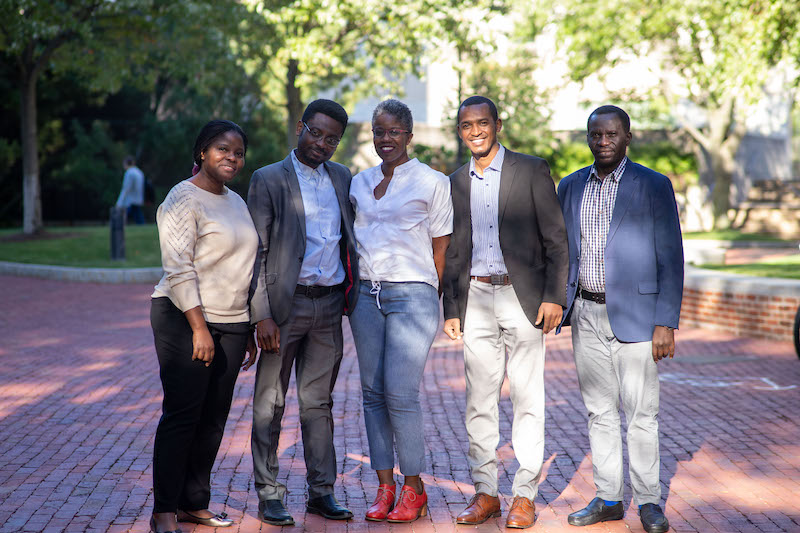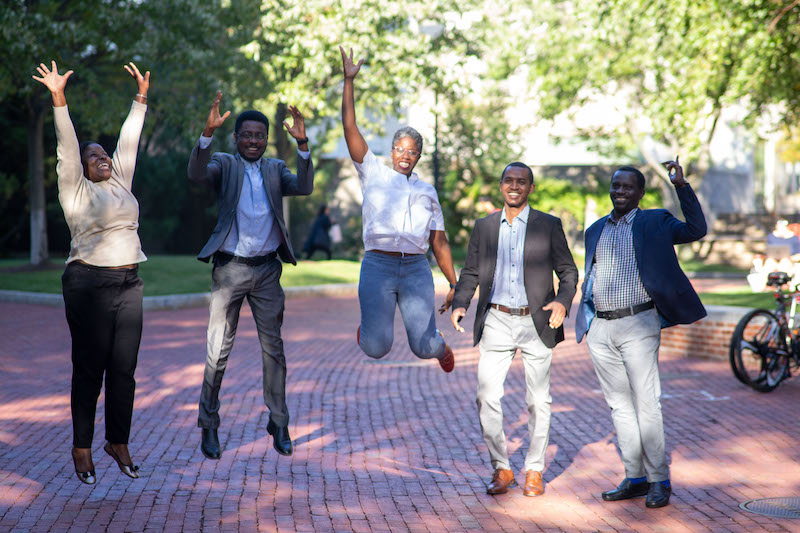Hailing from universities in Africa, four IREX fellows meet faculty and grants administrators at Northeastern
Author: Jane Kokernak and Sarah Olender
Date: 01.14.22
The world of grants is complex. Private foundations, industry, and government agencies in the U.S. fund institutional and faculty research that builds knowledge and drives innovation. Globally, the grants landscape varies dramatically. IREX, an international nonprofit, is working to address the disparities in global development and education.
 (L to R) Stella Kakeeto, Patrick Okonji, Andrea Stith, Sintayehu Tiruneh, and Jean Uwamahoro. Photo: Sarah Olender (2021).
(L to R) Stella Kakeeto, Patrick Okonji, Andrea Stith, Sintayehu Tiruneh, and Jean Uwamahoro. Photo: Sarah Olender (2021).
Recently, four fellows from research universities in Africa visited Northeastern University for the first time for just this very reason – to understand grant funding in the U.S., make connections with research grants professionals, and build ties to faculty. They participated in the exchange through IREX and its University Administration Support Program (UASP).
Andrea Stith, the new director of research development at Khoury College of Computer Sciences, invited the four fellows to join her at Northeastern after their stint shadowing grants administrators and faculty at the University of California, Santa Barbara, where Stith previously worked. Stith herself had joined the Khoury College community just a few short weeks before the fellows from the IREX program arrived at Northeastern. As she was settling into her new role, Stith guided them through the process: “We talked about research development, pre-award support, what funding agencies are looking for, and opportunities in the U.S. and Europe.”
The UASP fellowship can be transformative. Stella Kakeeto, a grants manager from Makerere University in Uganda, described her experience as “intense, learning vertically and across institutions.” Patrick Okonji, a senior research fellow at the University of Lagos in Nigeria, commented on meaningful interactions with research faculty at Khoury College and the university. “We had very engaging and interesting conversations around what they do, their roles, and the challenges associated with working in such positions.”
Learning opportunity for the fellows and their home institutions
Stith’s support for the UASP fellowship program extended beyond her formal responsibilities. She said, “I personally wanted to engage with them because research should be a global enterprise,” adding, “I want to do my part to bridge the resource and training divide.”
During their time at both UC Santa Barbara and Khoury College, the fellows set out to learn about research management, grants administration, patents, and intellectual property, while also figuring out how to best implement these strategies at their home institutions.
Jean Uwamahoro has multiple roles at the University of Rwanda, the country’s public research university, as associate professor of physics, administrator, and deputy director of the center of teaching and learning in mathematics and science. “The university is taking the teaching of math and science really seriously to catch up with the developed world,” he explained, always seeking new tools for STEM education and communicating science. The UASP program, he said, enables “the ability to link up with international researchers and also international managers to learn about funding opportunities.” Uwamahoro has learned more, too, about creating effective grant applications.
The fellows learned that U.S. institutions have many more opportunities for government funding, through agencies such as the National Science Foundation, Department of Energy, and National Institutes of Health. The experience led Sintayehu Tiruneh, a UASP fellow from Addis Ababa Science and Technology University, to recognize the value in cultivating international research partnerships. For his university to grow in grants funding, he observed, “The answer is to make connections, make collaborations, because then you can apply with them [researchers at other institutions] and get funding.”
From meeting with faculty across Northeastern, especially the College of Engineering and College of Science, Tiruneh is solidifying potential collaborations; he has a doctorate in materials science and engineering and is an assistant professor at his university.
Reflecting on what she and the other UASP fellows have learned, Kakeeto remarked, “Now the onus is on us to decide what is applicable in our setting and how we apply it. Sometimes you do a trick here and there. Sometimes it’s not going to work. Now it’s up to us to filter what is going to make an impact in our context.”
Alignment with Khoury College’s mission
The IREX fellowship program helps train the next generation of university leaders, empowering them as catalysts for change at their home institutions. It also builds diversity in the global research grants community and fosters collaboration across borders.
Alan Mislove, who was Khoury College’s interim dean at the time, described the genesis of the college’s involvement. “This particular program, it came in from a new hire, Andrea Stith, but it was something that was so well aligned with our DEIAB activities that it absolutely made sense for us to support it.” He said, “We believe computing is for everyone. It underlies everything we do.”
As to what the fellows learned, Mislove said, “They got to see all sorts of how we structure research administration, both at the collegiate level, as well as at the university level.” He praised Stith for bringing the UASP fellows from UC Santa Barbara to Khoury College around the same time she was beginning her new role. He said, “It was really a testament to her, how well the program turned out, how much the fellows got out of it.”
From his interactions with the fellows, Mislove gained perspective on the differences and commonalities between research development in the U.S. and internationally. “What I learned in talking with them [was] the challenges that they face in their day-to-day jobs are sort of different, and the way that things are structured at their home institutions are different,” said Mislove. “[But] a lot of the basic challenges are very similar in terms of managing an organization, and dealing with how do you get people to agree on things.”
An enjoyable, rich experience with long-lasting effects
Aside from gaining valuable knowledge and initiating important connections, the fellows also got the opportunity to enjoy Boston and their trip here, too.
“I’ve met lots of wonderful people here in Northeastern, you have a very fantastic campus. It’s a beautiful campus. It’s so welcoming,” Okonji said.
Kakeeto commented on the benefits of shadowing researchers; the experience will have “long-lasting” effects, she said. “It demystifies some of the things you think about, to see others experiencing the same thing.” Her meetings with research grants managers at both Khoury College and Northeastern shed light on putting together grant applications, compliance, tools and systems, and “the whole cycle of funding.”
 (L to R) Stella Kakeeto, Patrick Okonji, Andrea Stith, Sintayehu Tiruneh, and Jean Uwamahoro. Photo: Sarah Olender (2021).
(L to R) Stella Kakeeto, Patrick Okonji, Andrea Stith, Sintayehu Tiruneh, and Jean Uwamahoro. Photo: Sarah Olender (2021).
Stith, who coordinated the fellows’ engagement on campus, described her commitment to this kind of professional growth. “For me, I really want them to feel supported in their proposal development efforts. I’m passionate about their critical role in the development of effective and meaningful research,” she said.
New to the Khoury College and Northeastern community, Stith was heartened by the warm welcome that the UASP fellows received. “I’d like to thank all the research administrators and faculty at the college and the university who were welcoming, encouraging, and so willing to help.”
Her outlook is optimistic. “I hope to see new opportunities as a result of this visit.”
Subscribe to the Khoury College newsletter
The Khoury Network: Be in the know
Subscribe now to our monthly newsletter for the latest stories and achievements of our students and faculty